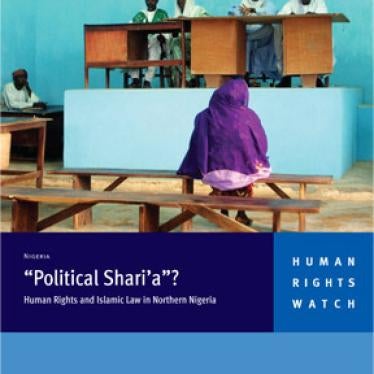In the days leading up to the appeal court judgment in the case against Amina Lawal, Human Rights Watch received a barrage of phone calls. From around the world came a huge wave of sympathy for the Nigerian woman who had been found guilty of adultery and sentenced to death by stoning. When she won her appeal on September 25, there was a collective sigh of relief - and another stream of requests for Human Rights Watch to comment on the verdict.
Human Rights Watch researcher Carina Tertsakian had just returned from a mission to states in northern Nigeria where Sharia (Islamic law) had been extended to cover criminal offenses. Tertsakian knew the issues cold, but she also knew that many reporters were chasing the wrong story.
“Amina Lawal’s case deserves attention, and we are delighted at the outcome of her appeal, but hers is not the only case, nor is the punishment of stoning the only human rights problem in Nigeria,” says Tertsakian, who has worked at Human Rights Watch since 2001. “Much of the Western media has oversimplified the issue by focusing exclusively on this type of punishment under Sharia.”
The more fundamental human rights issue in Nigeria is the dysfunctional justice system, Tertsakian noted. She also describes how dysfunction lies at the heart of how Islamic law is being practiced too. Amina Lawal, for example, was convicted in a trial that was seriously flawed and did not follow due process, even under the Sharia legislation. She was not aware of her rights and did not even have a defense lawyer until the appeal stage
Tertsakian’s reports for Human Rights Watch have highlighted the absence of justice that underlies Nigeria’s many human rights problems. Impunity for perpetrators of human rights violations and the inability of victims to obtain redress are the common threads linking problems as diverse as killings by the security forces, vigilante violence, and ethnic and religious conflicts.
Amina Lawal’s case has helped raise awareness of the parlous state of Nigeria’s justice system, but these other human rights problems, which have claimed several thousand lives since 1999, are crying out for the same level of attention.
Tertsakian, 41, formerly worked at Amnesty International as a researcher on Rwanda and the Great Lakes region. She works out of Human Rights Watch’s London office. Her next report will focus on violations of freedom of expression in Nigeria. She is also working on Human Rights Watch’s first substantial report on human rights in the context of Sharia in northern Nigeria.







